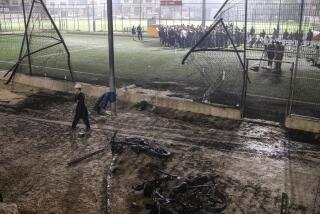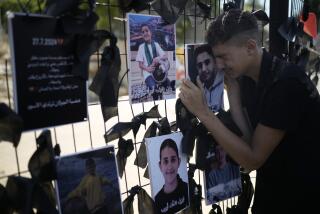15-Year-Old Killed in Kabul by Rebel Rockets : Sorrowing Afghans Bury ‘Martyr’
- Share via
KABUL, Afghanistan — They buried Temur Shah on Monday in the Cemetery of Five Hundred Families.
Hundreds of the 15-year-old boy’s neighbors in the suburb of Khai Khanna came to the cemetery in tears. They wept for him, they said, and also for relatives lost over the years.
And they wept, they said, for their country, which like the boy Shah has been ripped to pieces by 10 years of war.
The mourners called Shah the “martyr of the bread lines,” because he had spent hours each day waiting in long lines for his family’s bread ration. He was killed Sunday by one of the rockets fired into Kabul by rebel forces.
Bread lines have formed every day for weeks, since the rebel forces, the moujahedeen, cut the supply routes into the city. On Sunday, as he has for weeks, Shah had waited in line for more than three hours. It was nearly 3 p.m. when he finally paid his 30 afghanis--about 30 cents--for the family’s five pieces of nan and started home.
He was a few hundred feet from his destination when the rocket exploded in the street. The blast blew out windows in nearby houses and ripped a taxicab to shreds. And it killed Temur Shah, a 9th-grade student whose knowledge of the war did not go beyond what he heard on the government-controlled radio.
“Who knows why these rockets fall on us?” Mohammed Arif, 14, Shah’s friend, neighbor and classmate, said Monday as he stood on the spot where Shah had been killed. “All I know is that it is the enemy.”
The rockets have become a daily occurrence in Kabul. The rebels, supplied by the United States, have intensified the pressure on Kabul, the seat of President Najibullah’s Soviet-supported government.
Anniversary of Revolution
Thursday will be the 11th anniversary of the start of the leftist revolution that brought Najibullah’s party to power, and, as a diplomatic source observed, “The moujahedeen are trying to spoil the government’s party.”
But most of the rockets seem to be falling on Khai Khanna, a poor residential section of about 450,000 people that consists largely of mud-walled houses. Military analysts say it just happens to be situated between the rebel bases and their principal target, Kabul’s international airport.
The government confirmed Monday that a dozen rockets had fallen on Khai Khanna the day before, killing at least 12 people. The rebels, a government spokesman said, appeared to be aiming at a power substation but were killing only civilians. So far, he said, “they have not hit a single military or economic target.”
People in Khai Khanna are confused by the rockets.
“Who can tell why these rockets are coming?” a local official, Mohammed Yussef, asked a couple of American reporters. He said he is neither pro-government nor pro-rebel, adding: “What do we have here in Khai Khanna? We have nothing. You can see how we live. You see the hole in my window blown out by this rocket; I cannot afford the glass to replace it. You see how cold it is here in my house; I have no fuel for heat. I cannot even offer you food, and for an Afghan this is a terrible thing.”
‘Why Send Us Rockets’
Yussef directed the reporters’ attention to a young man standing beside him and said: “You see this boy. What does he have that anyone would want? He has one less in his family, that is all. This is the brother of Temur Shah. Now tell me, please, why does your country send these rockets to us?”
Like most of the people in his neighborhood, Yussef knows that the rockets the rebels use were made by China and purchased for the moujahedeen by the United States--part of the $2 billion worth of arms the United States supplied after the Soviets sent troops here in 1979.
The Soviets pulled out the last of their troops two months ago, and Yussef and others wonder why the American-supplied rockets are still falling on them.
“When the Russians left here, we were all happy,” Yussef said. “I am an Afghan. I don’t want this kind of help from others. We want our freedom. We are happy the Russians have left, but the Americans are still sending us their rockets. Why? The great nations of the world should just leave us alone to settle our own problems, and we will solve them our way.”
Except for his front window, Yussef and his family have been spared by the rockets, which have killed scores of people just in Khai Khanna. But he has suffered in other ways, he said. He asked his son to pull back a soiled sheet covering a wall of his sitting room, and behind it was a collection of musical instruments, a sitar, a harmonium and a drum. Yussef explained that he is a musician, a player of ghayals, religious songs.
“I have not played these for four years,” he said. “I cannot concentrate with all the rockets. I cannot even read a book. I have decided that I will not play these again until the governments of Russia, America, China, Pakistan and the other big countries can hear our music, until they hear our appeal that all we want is peace.”
Yussef said that when Temur Shah was killed, his mother “said something important.” He said she had told neighbors: “I want all the mothers of the world to know this is what is happening to us. My child is dead, but he is the child of all the mothers of the world. And I speak for all those mothers when I ask the world to please send us only peace.”
But even after they buried Temur Shah, not far from the graves of the rocket’s other victims, explosions could be heard in other parts of the city. And more funerals were being scheduled for today.
More to Read
Sign up for Essential California
The most important California stories and recommendations in your inbox every morning.
You may occasionally receive promotional content from the Los Angeles Times.













